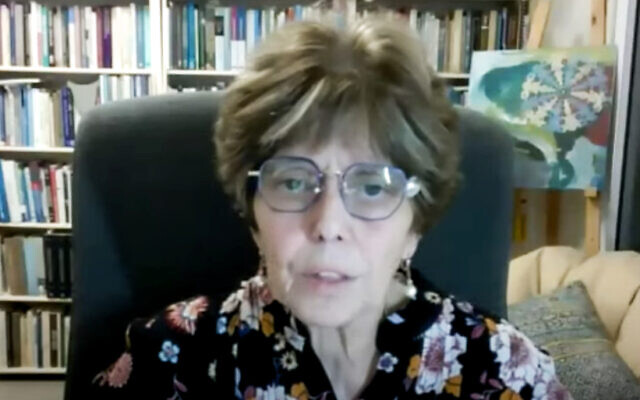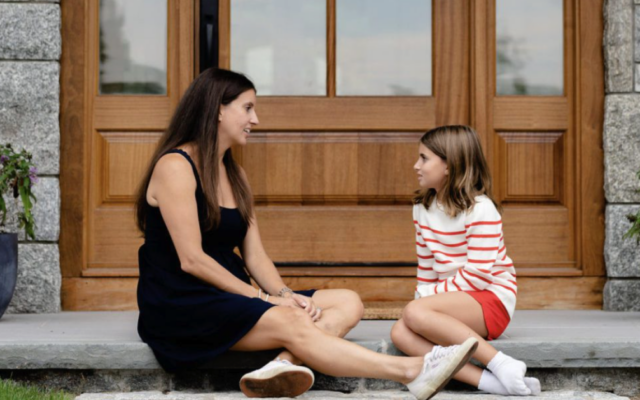Israeli Psychologist Offers Advice on Children & War
Presentation to Jewish Grandparent Network stressed the important of adults understanding their own feelings before speaking with children.
Sharona Mital, an Israeli psychologist and a crisis intervention specialist, is working with children in Israel who have survived the recent invasion by Hamas terrorists.
Mital, who has a PhD from Temple University in Philadelphia, has years of experience that date back to Israel’s 1973 Yom Kippur conflict counseling youngsters living with vivid memories of war. In a recent presentation for the Jewish Grandparents Network, she shared some of her strategies about how she talks with young people about the tragedy.
The psychotherapist, who has been a long-time resident of Israel, told the online audience of over a hundred participants that the best starting point for such a conversation is not with the children but with yourself.
“The most important step one is self-awareness,” Mital said. “We need to think about how are we responding to what’s happening in Israel. Even before we think about talking with our grandkids, what are we feeling? I know that’s my tendency is to immediately say, okay, what can I do? How can I do things? And to keep myself very, quite busy as a way of coping. Are we able to take a deep, deep breath and relax ourselves?”

Mital is working with a group of Israeli children, who are as young as four, who escaped from their kibbutz in southern Israel when it was attacked. While they are highly traumatized by what they experienced, there are many other children, especially in America, far from the scene of the tragedy, who see pictures on the Internet or on news broadcasts that can have a profound effect on them and on their parents as well. Talking with children, Mital believes, can often be made more difficult when we don’t acknowledge our own discomfort.
“A child knows exactly how mom feels. And yeah, they see what we feel. They feel what we feel, and they respond in return. They also know if we are avoiding and don’t want to talk about things. We don’t have to tell them, ‘Don’t talk about that.’ They sense it. They know it. Their antenna are very, very, key. And that’s one of the things that we need to realize when we’re talking to children, to grandchildren, is that a key factor is how we’re feeling and how we are coping.”
With a clearer sense of how we are coping with the day’s news, we can start to understand children’s feelings. We shouldn’t rush to tell young people what we want them to know without taking the time to understand where they are at any given moment.
“We need to try to understand what they know and how they understand the situation. We need to see what they’re feeling, what they’re thinking. And one of the difficulties especially with the older ones, they have a lot of ideas of their own and we need to ask them to tell us what they personally think.”
Often, when she is working with children in Israel, she finds that her most important ally is a sense of patience. Children often take time to give us a better understanding of what they are experiencing. It may not always come out in conversations we may have with them, but in the way they interact with others and even the way they express themselves in non-verbal ways through art, for instance.
A child knows exactly how mom feels. And yeah, they see what we feel. They feel what we feel, and they respond in return. They also know if we are avoiding and don’t want to talk about things. We don’t have to tell them, ‘Don’t talk about that.’ They sense it. They know it. Their antenna are very, very, key. And that’s one of the things that we need to realize when we’re talking to children, to grandchildren, is that a key factor is how we’re feeling and how we are coping.
What she has found in working with those who have been deeply affected by war is not to be too quick to impose our own experiences on them.
“We need to talk with them, not at them. And we need to be able to share ideas that are different with honesty and without trying to debate and win them over, especially when they’re older.”
In her own experience in working with children, she has found that one of the most important contributions that a parent can make to their children is to give them a sense of hope about the future. She mentions that the English translation of the title of Israel’s national anthem, “Hatikvah,” is, after all, hope.
“Our focus,” Dr. Mital believes,” shouldn’t be on the terrible things people have seen and are feeling, but what can we do, both children and adults? What can we do now, in very concrete ways, to help change what is going on in the world. It’s simple, but it creates a sense of resilience, a great sense that, yes, we’re going to get beyond this.”




comments